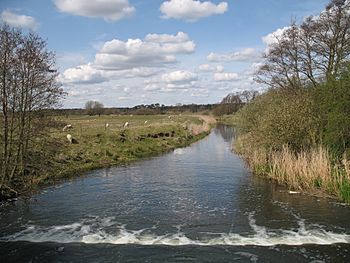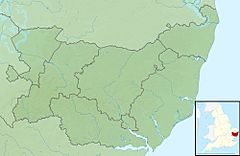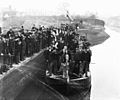River Lark facts for kids
Quick facts for kids River Lark |
|
|---|---|

The river near Icklingham
|
|
|
Location of the river mouth just outside Suffolk
|
|
| Country | England |
| Physical characteristics | |
| Main source | Whepstead 104 m (341 ft) 52°11′18″N 0°39′09″E / 52.1883°N 0.6525°E |
| 2nd source | Bradfield Combust 65 m (213 ft) 52°10′39″N 0°43′57″E / 52.1775°N 0.7325°E |
| River mouth | Littleport, River Great Ouse 0 m (0 ft) 52°26′07″N 0°18′43″E / 52.4352°N 0.3120°E |
| Length | 31 km (19 mi) |
The River Lark is a river in England. It flows through both Suffolk and Cambridgeshire. The Lark is a smaller river that flows into a bigger one called the River Great Ouse. Long ago, the River Great Ouse was changed to help drain the land better, and the River Lark was made longer as part of this project. People think the River Lark has been used for boats since the time of the Romans.
Contents
Exploring the River Lark
A River's Journey Through Time
In 1638, and again in the early 1700s, people worked to make the River Lark easier for boats to travel on. They built special structures called locks and staunches. These helped boats move up and down the river, even when the water level changed. The river's journey for boats used to start near Bury St Edmunds.
Later, in 1846, a new railway line opened, called the Eastern Union Railway. Because of this, a new dock was built closer to the railway station. This made it easier to move goods between boats and trains.
Changes to River Use
Even though the river was officially no longer used for large boats in 1888, smaller boats continued to use it for business until 1928.
In the 1960s, some of the locks at Barton Mills and Icklingham were rebuilt. However, soon after, a new bridge for the A11 road was built lower over the river. This made it impossible for boats to reach these rebuilt locks. Today, the River Lark has only one working lock, which is at Isleham. You can still travel by boat on the river up to a place called Jude's Ferry.
River Health and Wildlife
In 2016, experts checked the water quality of the River Lark. Most of the river had moderate water quality. However, one part of the river had bad water quality, which is the lowest rating given by the Environment Agency. This agency keeps an eye on the health of rivers in England.
The River Lark is home to many signal crayfish. These are an invasive species, meaning they are not originally from this area and can cause problems for local wildlife. Their numbers have grown as the population of eels in the river has gone down.
Images for kids
 | Toni Morrison |
 | Barack Obama |
 | Martin Luther King Jr. |
 | Ralph Bunche |




